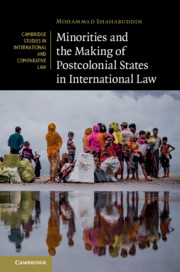Book contents
- Minorities and the Making of Postcolonial States in International Law
- Cambridge Studies in International and Comparative Law: 154
- Minorities and the Making of Postcolonial States in International Law
- Copyright page
- Dedication
- Contents
- Foreword
- Acknowledgements
- Table of Cases
- Abbreviations
- Introduction
- Part I Ethno-nationalism and the Ideology of the Postcolonial State
- Part II International Law and the Postcolonial State
- 3 The Postcolonial ‘National’ State:
- 4 The Postcolonial ‘Liberal’ State
- 5 The Postcolonial ‘Developmental’ State
- Conclusion
- Bibliography
- Index
- Cambridge Studies in International and Comparative Law
4 - The Postcolonial ‘Liberal’ State
Self-determination, Minorities, and International Law
from Part II - International Law and the Postcolonial State
Published online by Cambridge University Press: 21 May 2021
- Minorities and the Making of Postcolonial States in International Law
- Cambridge Studies in International and Comparative Law: 154
- Minorities and the Making of Postcolonial States in International Law
- Copyright page
- Dedication
- Contents
- Foreword
- Acknowledgements
- Table of Cases
- Abbreviations
- Introduction
- Part I Ethno-nationalism and the Ideology of the Postcolonial State
- Part II International Law and the Postcolonial State
- 3 The Postcolonial ‘National’ State:
- 4 The Postcolonial ‘Liberal’ State
- 5 The Postcolonial ‘Developmental’ State
- Conclusion
- Bibliography
- Index
- Cambridge Studies in International and Comparative Law
Summary
Chapter four demonstrates how the post-WWII liberal vision of international law feeds into the ideology of the postcolonial ‘liberal’ state in the form of ‘individualism’, thereby dominating the discourse on minority protection. One direct implication of the dominance of liberal individualism in the postcolonial constitutional architecture of rights is the denial of protection for minority groups. The liberal human rights regime is designed to diffuse cultural groups into individual units, so as to facilitate their assimilation into a homogeneous national (read majoritarian) identity. This chapter explains how international law, with its liberal underpinning, shrinks the scope of the right to self-determination and thereby perpetuates the vulnerability of, or in some cases even leads to the extinction of, minority groups. In this connection, I also highlight the peculiar challenge that postcolonial states face in reconciling the diverging forces of ‘liberal individualism’ and majoritarian ‘ethno-nationalism’. The former emanates from the liberal international legal order, the latter from the nationalist discourse of allegiance, entitlement, and legitimacy. The issue of citizenship and statelessness is also discussed in this context. My arguments in this chapter are supported by in-depth case studies on the Rohingya and the CHT hill people.
Keywords
- Type
- Chapter
- Information
- Publisher: Cambridge University PressPrint publication year: 2021



